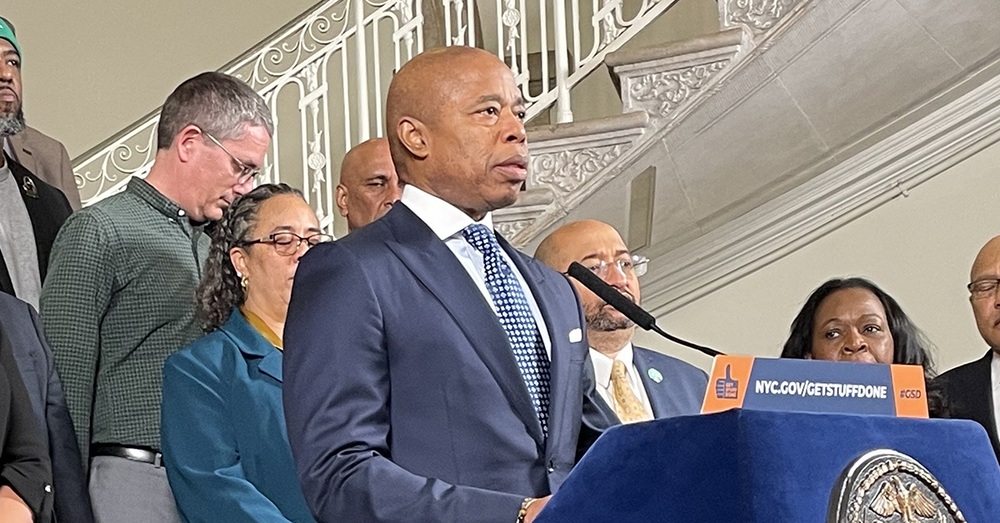Mayor Adams strikes union deal that includes an option for remote work
Feb. 17, 2023, 10:31 a.m.
The tentative agreement grants DC37 members roughly 3% annual raises over five years, bonuses, and a plan to allow some city employees the option to work remotely as early as this summer.

Mayor Eric Adams on Friday announced a tentative deal with District Council 37, the city’s largest municipal union, that would grant its members roughly 3% annual raises over five years, bonuses, and a plan to allow some city employees the option to work remotely as early as this summer.
“I have made no secret that I am a blue-collar mayor,” Adams said during a news conference in City Hall.
He began by speaking about his late mother, who had been a member of DC37 as a food service worker, as well as his own experience as an NYPD police officer.
“This is in my blood,” he said.
The agreement, which needs to be ratified by union members, resolves a key challenge facing the mayor, who has strong relationships with labor but is seeking to contain costs during an uncertain economic period for the city. The recovery has shown signs of slowing and some economic experts are warning that a recession is in the wings.
All told, the deal will cost the city more than $4 billion, according to city officials. It notably does not require the union to make concessions toward paying for health care.
"The unpaid fiscal bills in the future just got bigger," said Andrew Rein, the president of the Citizens Budget Commission, who added that city employees should be asked to help pay for their health insurance. New York City is rare among public-sector employers in that it does not require municipal employees to contribute to health insurance premiums.
Brad Lander, the city's comptroller, hailed Friday's news for bringing "welcome clarity about future labor costs as we enter budget season." Although he said his office was still analyzing the agreement, he praised the inclusion of a remote work option as well as recruitment initiatives.
"As agencies work to adjust to new hybrid work norms and set out thoughtful policies to advance both employee morale and efficient government service, we remain eager to collaborate to help city government work better," Lander said in a statement.
Under a process known as "pattern bargaining," the agreement with DC37 will set the standard for the remaining non-uniformed unions — including the teachers’ union — that are negotiating with the city.
Among the expired contracts looming over the administration is the contract for the city's biggest police union, the Police Benevolent Association, which is undergoing state-supervised arbitration. On Friday, the union's president, Patrick Lynch, congratulated DC37 on reaching an agreement but urged the city to reach a resolution soon with its members, whom he described as being "stretched well past our breaking point."
Asked about health care costs, Adams told reporters he was committed to finding health care savings. His administration is currently trying to move retired city workers to a private insurer. City officials estimate this would generate $600 million in savings for taxpayers, but have encountered fierce resistance from those who would be affected by the shift.
In addition to raises, the union's members will receive a $3,000 lump sum bonus. The deal also raises the minimum wage for city workers to $18 an hour, above the $15 minimum wage standard previously set in 2016.
Adams' decision to allow remote work represented a major victory for city workers, who have clamored for the same flexibility that many private companies offer. The city also agreed to consider work schedules outside of the traditional 9-to-5 work week, as well as improved transit benefits.
The mayor had previously balked at the idea of remote work, arguing that having workers report to offices was crucial for the city's recovery and that the arrangement could be seen as unfair to essential workers who had no choice but to work in person.
On Friday, Adams said the city and union had agreed to "keep in mind equity all the way" as part of its remote work plan, which will begin as a pilot program no later than June. Earlier this week, he said any remote work offering should provide additional compensation for essential workers.
Settling the contracts with labor unions could help Adams as he tries to address the ongoing city worker shortage. The two sides agreed to establish an annual $70 million "equity fund" that will go toward salary increases to help fill difficult-to-recruit jobs. Both parties will contribute toward the fund, the mayor's office said.
DC37, which endorsed Adams during his mayoral primary campaign, represents 100,000 city workers across a wide breadth, including 911 operators, social service workers and parks staffers. The union is one of dozens whose contracts have expired. City workers have demanded raises that reflect their work during the pandemic as well as the burden of inflation.
Both parties were negotiating until midnight on Thursday. They have been holding bargaining meetings since September.
"This is by far the most challenging and the most difficult negotiations we have had," said Henry Garrido, DC37's executive director. He cited the spiraling cost of health care, the challenges of the pandemic, and the ongoing debate over remote work.
Nevertheless, Garrido said he was confident the members would ratify the agreement.
Donald Nesbitt, the political director for DC37 who was among those present at the news conference, praised the deal, calling it the best union contract he had seen since becoming a member in 1998.